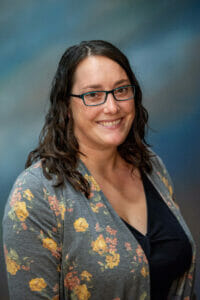 Kayla Wells-Yoakum is a Regional Specialist with WSU Colville Reservation Extension, providing outreach education in the areas of personal finance, food safety & food preservation and parenting education. She primarily works within the boundaries of the Colville Reservation, but as a Regional Specialist, she also provides her expertise state-wide.
Kayla Wells-Yoakum is a Regional Specialist with WSU Colville Reservation Extension, providing outreach education in the areas of personal finance, food safety & food preservation and parenting education. She primarily works within the boundaries of the Colville Reservation, but as a Regional Specialist, she also provides her expertise state-wide.
AFCPE: What led you to a career in personal finance? And what inspires you to continue doing this work today?
Kayla: What led me to choosing personal finance as one of my main program areas with Extension, was that I saw the need for that type of education on the Colville Reservation. When I started teaching personal finance, there wasn’t another Tribal Program that was providing that type of education to their clients. Therefore, I was able to fill a need for my Reservation clients.
What inspires me to continue doing this work today is that the need for personal finance education still exists. There are Tribal Programs that still request my classes for their clients. As long as there is a need, I will continue to offer personal finance education as one of my program areas.
AFCPE: What does Native American Heritage Month mean to you?
Kayla: Native American Heritage month is a month to celebrate what makes the Native American culture and people unique. It’s a month to celebrate the past, present and future. We should be honoring ancestors, celebrating current accomplishments and making plans for a positive and prosperous future for generations to come.
AFCPE: The Native American community has faced a variety of challenges for hundreds of years. The effects of these challenges are still being felt today, especially when it comes to their financial well-being. What do you want financial professionals to know about working with the Native American community? How can they help raise awareness about important issues affecting this community?
Kayla: I would encourage financial professionals to get to know their audience(s). The challenges being faced by Native Americans today aren’t necessarily different from the challenges being faced by other people. And the challenges faced on one reservation may not be the same challenges faced on another reservation. Basically, my advice is to not lump all Native American people into the same “box.” People should be treated as individuals facing their own, unique challenges. Spend time getting to know people before starting to develop an educational plan. Make plans to stick around and earn peoples’ trust. Talking about money is difficult for most people; it becomes even more difficult to talk about money when there isn’t trust between clients and educators.
AFCPE: Are there any resources you want to share with professionals to assist them with working with the Native American Community?
Kayla: The First Nations Development Institute is a good resource. I use a handful of the resources from their Financial Empowerment page when I provide personal financial education.
AFCPE: Are there any other projects or initiatives you are working on?
Kayla: When the pandemic started in 2020, I started the process of adapting my personal finance workshops for virtual delivery. This has been a slow process, mainly because many of our reservation-based clients do not have access to strong enough broadband to support Zoom or any other platform used for virtual education.
AFCPE: What is the best way to connect with you (social links, etc.)?
Kayla: Email: kayla.wells@wsu.edu
Kayla answers the Friday 5:
- My Why: I’m an educator because I want to help people develop skills they will need to be successful in their futures.
- My Favorite Quote: “With hard work and effort, you can achieve anything.” -Antoine Griezmann
- My Hero: My parents
- My Favorite Resource: Building Native Communities: Financial Skills for Families
- My Best Advice:
- For someone starting the journey to financial well-being: Know exactly how much money is coming in each month and know exactly how much money you’re spending and what you’re spending that money on. Don’t leave your finances up to chance.
- For a new professional: Make your education relevant to the people you are trying to reach. People learn best when new learning is anchored in their own lived experiences.
Leave a Reply